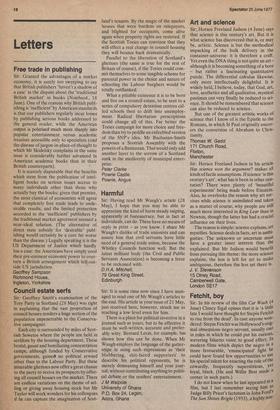Free trade in publishing
Sir: Granted the advantages of a market economy, it is surely too sweeping to say that British publishers 'haven't a shadow of a case' in the dispute about the 'traditional British market' in books (Notebook, 18 June). One of the reasons why British publishing is 'inefficient' by American standards is that our publishers regularly incur losses by publishing serious books addressed to the general reader, while the American output is polarised much more sharply into popular entertainment versus academic treatises accessible only to specialists (and the disease of jargon-in-place-of-thought to which Mr Skidelsky complains in the same issue is considerably further advanced in American academic books than in their British counterparts).
It is scarcely disputable that the benefits which stem from the publication of intelligent books on serious issues accrue to many individuals other than those who actually buy the books; given that premise, the most classical of economists will agree that completely free trade leads to undesirable results, and the limited protection accorded to the 'inefficient' publishers by the traditional market agreement seemed a near-ideal solution. (The alternative of direct state subsidy for 'desirable' publishing would certainly be a cure far worse than the disease.) Legally speaking it is the US Department of Justice which hardly has a case: the Americans have simply used their pre-eminent economic power to overturn a British arrangement which fell outside US jurisdiction.
Geoffrey Sampson
Richmond House, Ingieton, Yorkshire














































 Previous page
Previous page